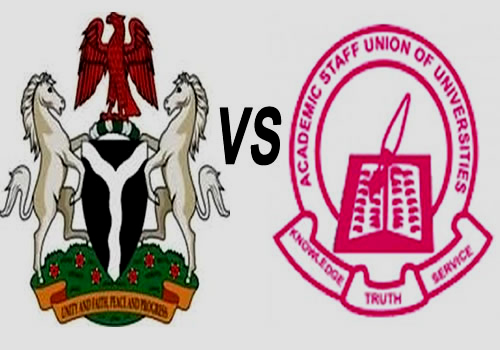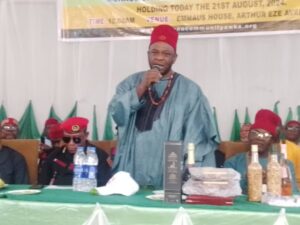ASUU and FGN face-off: Understanding the issues

The ongoing face-off between ASUU and the FGN over various issues such as unpaid salaries and Earned Academic Allowance, Improved welfare package for her members, poor infrastructure, and lack of funding for universities highlights the systemic challenges facing the education sector in Nigeria. It is crucial for both parties to engage in constructive dialogue and reach a mutually beneficial resolution for the sake of the students and the future of higher education in the country.
ASUU strikes in Nigeria have a long history, with the union fighting for improved funding, better working conditions, and academic freedom.
In 1988 – 1990, during the time of the ASUU’s founding President, Dr. Mahmud Modibbo Tukur; ASUU’s first national strike, lasting 14 months, over poor funding, autonomy, and academic freedom. The strike was a response to the Military Government’s refusal to address the decay in the education sector. The strike led to the establishment of the Nigerian Education Bank and increased funding for universities.
Question: Has Government been able to fund education, grant autonomy, and academic freedom?
In 1992 during the ASUU’s then President, Dr. Attahiru Jega; ASUU embarked on a 3-month strike over the government’s failure to implement the 1988 agreement. The Government reneged on its promises, leaving ASUU with no choice than to strike. Though the strike resulted in the Government setting up a committee to review university’s funding.
Question: Has Government been able to implement the 1988 agreement?
In 1996, ASUU went on a 5-month strike over the Government’s plan to introduce tuition fees. ASUU argued that tuition fees would make education inaccessible to many Nigerians. The strike led to the Government abandoning its plan to introduce tuition fees.
Question: Has Government really and actually abandoned it’s plan to introduce tuition fees?
In 2001 during the ASUU’s then President too, Dr. Ukachukwu Awuzie; ASUU embarked on a 3-month strike over poor funding and the Government’s failure to honor previous agreements. The Government has consistently failed to meet it’s obligations to the education sector. The strike resulted in a 25% increase in the university funding.
Question: Has Government been able to fund education till date and honor previous agreements?
In 2007 during the ASUU’s then President again, Dr. Abdullahi Sule-Kano; ASUU went on a 3-month strike over the Government’s failure to implement the 2001 agreement. The Government has refused to honor it’s commitments, leaving ASUU with no choice but to strike. The strike led to the government setting up a committee to review universities’ funding and autonomy.
Question: Has Government honored it’s commitments since then?
In 2011 during the ASUU’s then-President yet again, Dr. Ukachukwu Awuzie; ASUU embarked on a 5-month strike over poor funding, autonomy, and academic freedom. The Government has failed to address the decay in the education sector, despite numerous agreements (MoU, MoA, etc). The strike resulted in a 53% increase in university’s funding and the establishment of the Tertiary Education Trust Fund (TETFund).
Question: Does it mean that the Government is above the law that grants her impetus not to honour her numerous agreements?
In 2013 during the ASUU’s then-President yet again, Dr. Nasir I. Fagge; ASUU went on a 5-month strike over the Government’s failure to implement the 2009 agreement. The Government has refused to honor its commitments, leaving ASUU with no choice but to strike. The strike led to the Government releasing N30 billion to universities and setting up a committee to review university’s funding.
Question: After reviewing university’s funding, what happened to it’s implementation?
In 2020 during the ASUU’s then-President yet again, Dr. Biodun Ogunyemi; ASUU embarked on a 9-month strike over the Government’s failure to implement the 2019 agreement. The Government has failed to address the decay in the education sector, despite numerous agreements. The strike resulted in the Government releasing N40 billion to universities and agreeing to implement the University Transparency and Accountability Solution (UTAS).
Question: Have they implemented the University Transparency and Accountability Solution (UTAS)?
Note: The Government should fulfill it’s obligations and agreements with ASUU in order to maintain trust and credibility in the education sector. Nigerians should ask government why they can’t honour her commitments for peace to reign in the education sector.
Does ASUU mean well for Nigerians?
Here are some points to let the public know that ASUU means well for Nigerians:
- ASUU’s fight is for quality education, not personal gain.
- They demand adequate funding to improve university’s infrastructure and facilities.
- ASUU advocates for better working condition to attract and retain top talent.
- They push for academic freedom and autonomy to ensure unbiased research and teaching.
- ASUU’s struggles aim to produce well-educated graduates who can drive Nigeria’s progress.
- They seek to reverse brain drain and make Nigeria a hub for intellectual excellence.
- ASUU’s efforts align with the United Nations’ Sustainable Development Goal 4 (Quality Education).
- By fighting for education, ASUU ultimately fights for Nigeria’s future and prosperity.
- ASUU’s demands benefit not just lecturers but also students, parents, and the nation as a whole.
- ASUU’s resolve is to create a better Nigeria through education, not to disrupt the status quo.
By emphasizing these points, the public can understand that ASUU’s actions are motivated by a desire to improve Nigeria’s education system and ultimately benefit the country.
Need for a Lasting Solution to ASUU Strikes
The need for a lasting solution to ASUU strikes is imperative to address the recurring issues and promote a stable and quality education system in Nigeria. A lasting solution will:
- Ensure academic stability and continuity
- Improve the quality of education and research
- Enhance the reputation of Nigerian universities
- Attract and retain top talent in the academic profession
- Foster a conducive learning environment for students
- Promote economic growth and development
- Reduce brain drain and encourage brain gain
- Build trust and confidence in the education system
- Encourage public-private partnerships in education
- Support Nigeria’s progress towards achieving the SDGs (Sustainable Development Goals) To achieve a lasting solution, consider the following:
- Dialogue and negotiation
- Implementing previous agreements
- Addressing the root causes of strikes (funding, autonomy, etc.)
- Establishing a sustainable funding model
- Encouraging community engagement and support
- Fostering collaboration between ASUU, FGN, and other stakeholders
- Promoting transparency and accountability
- Supporting education reform and innovation
- Encouraging student involvement in the resolution process
- Celebrating successes and progress in the education sector
By working together and committing to a lasting solution, Nigeria can ensure a world-class education system that benefits all.
©️ Innocent Nnubia, PhD
[email protected]









